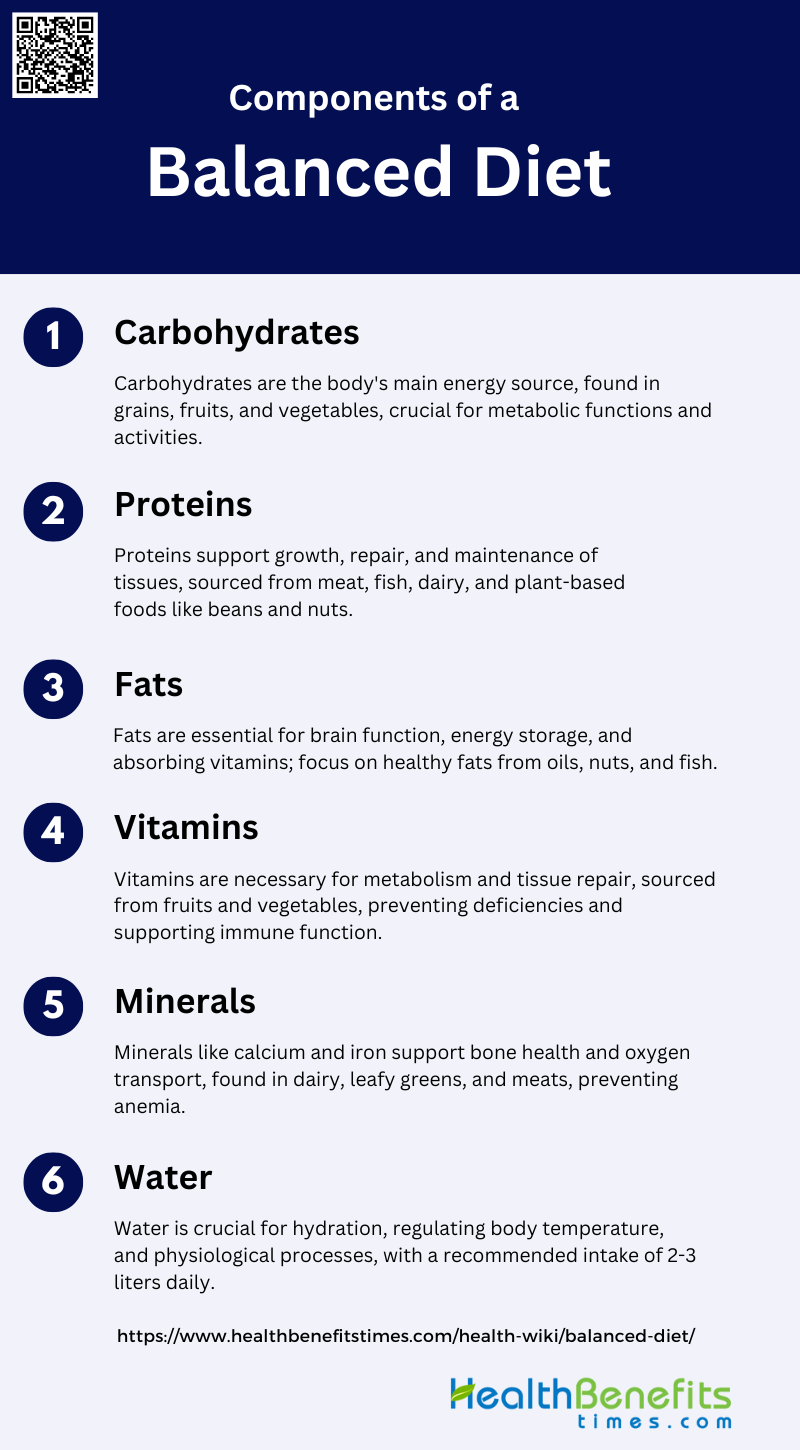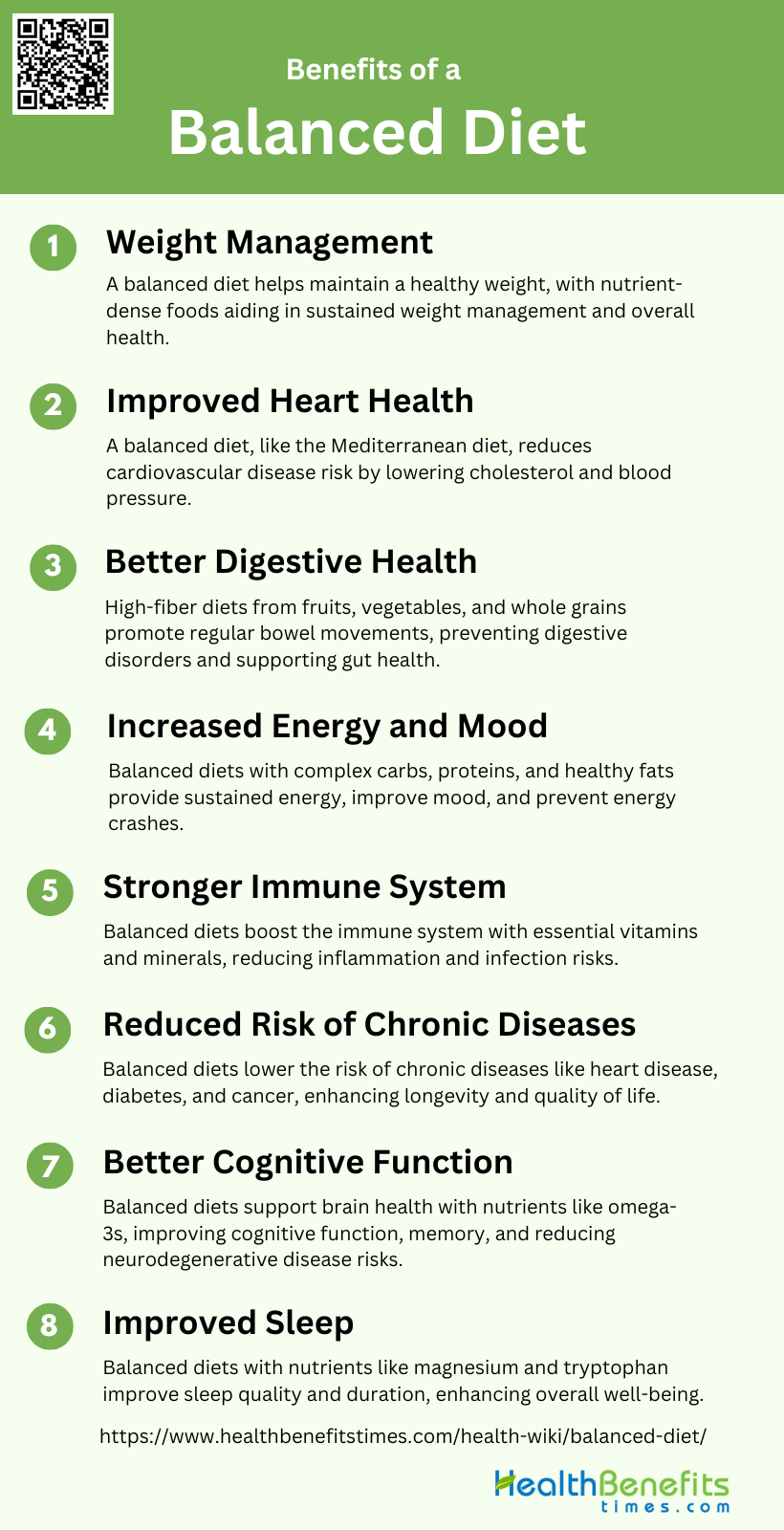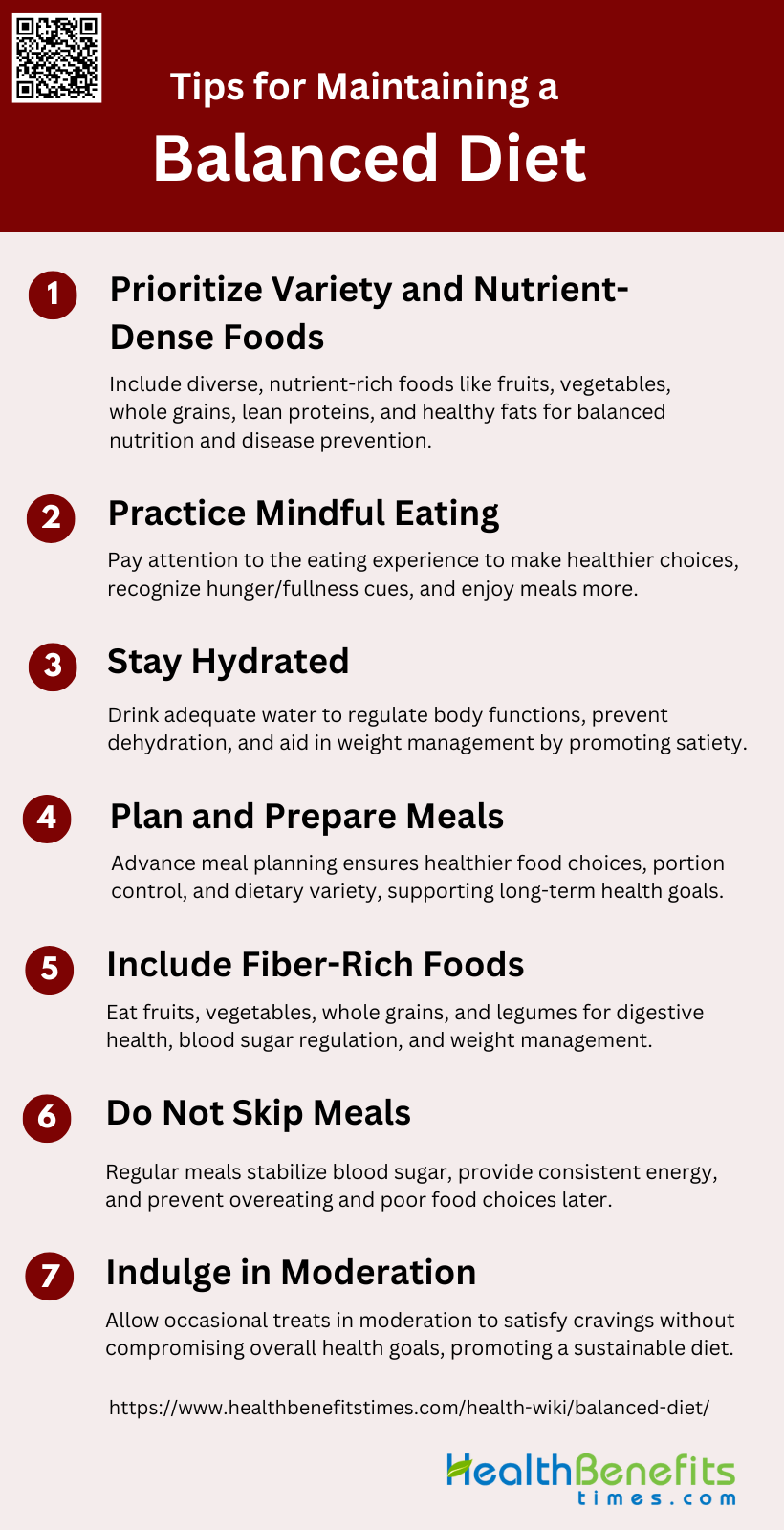A balanced diet is an eating plan that provides the body with all the essential nutrients, vitamins, and minerals it needs to function correctly. It involves consuming a variety of foods in the right proportions, including fruits, vegetables, grains, proteins, and dairy, while limiting the intake of processed foods, sugars, and unhealthy fats. This type of diet supports optimal physical and mental health, enhances productivity, and helps prevent chronic diseases such as obesity, diabetes, and cardiovascular conditions. By ensuring a proper balance of macronutrients (carbohydrates, proteins, and fats) and micronutrients (vitamins and minerals), a balanced diet fosters overall well-being and reduces the burden on healthcare systems by minimizing diet-related health issues.
Components of a Balanced Diet
A balanced diet is essential for maintaining optimal health and well-being. It provides the body with the necessary nutrients to function effectively and protect against diseases. The key components of a balanced diet include:
1. Carbohydrates
Carbohydrates are the primary source of energy for the body, essential for fueling daily activities and maintaining metabolic functions. They are found in grains, fruits, and vegetables, which also provide dietary fibers and essential nutrients. However, excessive intake of highly processed carbohydrates can lead to rapid fluctuations in blood glucose levels and contribute to chronic diseases such as obesity and type 2 diabetes. A balanced diet should include whole grains and other low-glycemic index foods to prevent these adverse health outcomes.
2. Proteins
Proteins are crucial for growth, repair, and overall maintenance of body tissues. They serve multiple functions, including acting as an energy source and aiding in cell signaling. High-quality proteins are found in meat, fish, eggs, dairy products, and plant-based sources like beans and nuts. Animal proteins are often considered ‘complete’ due to their comprehensive amino acid profiles, while plant proteins can be ‘incomplete’ but still valuable when consumed in a varied diet.
3. Fats
Fats are necessary for brain function, energy storage, and the absorption of fat-soluble vitamins. Healthy fats, such as those found in oils, nuts, and fish, should be included in a balanced diet. These fats, particularly omega-6 and omega-3 fatty acids, play a role in preventing cardiovascular diseases and supporting cognitive health. It is important to focus on unsaturated fats from natural sources and limit the intake of saturated and trans fats.
4. Vitamins
Vitamins are essential for various body functions, including metabolism, energy release, and tissue repair. They cannot be synthesized by the body and must be obtained through diet. Fruits and vegetables are rich sources of vitamins, particularly vitamins A and C, which have antioxidant properties and support immune function. A balanced diet with a variety of fruits and vegetables ensures adequate vitamin intake and helps prevent deficiencies.
5. Minerals
Minerals are involved in numerous biological functions, such as energy production, bone structure, and oxygen transport. Key minerals like calcium and iron are found in dairy products, leafy greens, and meats. These minerals are crucial for maintaining bone health and preventing anemia. A diet rich in diverse food groups ensures sufficient mineral intake to support overall health.
6. Water
Water is vital for hydration, regulating body temperature, and facilitating various physiological processes. Adequate daily water intake is essential for maintaining health and preventing dehydration. Recommendations for daily water intake vary based on individual needs, but generally, it is advised to consume around 2-3 liters per day. Proper hydration supports metabolic functions and overall well-being.
Benefits of a Balanced Diet
A balanced diet is crucial for overall health and well-being. It ensures that the body receives essential nutrients, supports immune function, and promotes energy levels. The benefits of a balanced diet include:
1. Weight Management
A balanced diet is crucial for effective weight management. Studies have shown that diets rich in whole, nutrient-dense foods such as fruits, vegetables, lean proteins, and healthy fats can help maintain a healthy weight. For instance, a systematic review comparing low carbohydrate and balanced diets found that both were effective for short-term weight loss, but balanced diets were easier to adhere to in the long term, leading to sustained weight management. Additionally, calorie restriction, a component of many balanced diets, has been shown to result in significant weight loss and improved overall health in non-obese adults.
2. Improved Heart Health
A balanced diet plays a significant role in improving heart health. The Mediterranean diet, which is rich in fruits, vegetables, whole grains, and healthy fats like olive oil, has been shown to reduce the risk of cardiovascular diseases. This diet’s anti-inflammatory and antioxidant properties contribute to better heart health by lowering cholesterol levels and blood pressure. Furthermore, regular consumption of nuts, such as almonds, has been associated with reduced serum triglycerides and improved lipid profiles, which are critical markers of cardiovascular health.
3. Better Digestive Health
A diet high in fiber from fruits, vegetables, and whole grains promotes better digestive health. Fiber aids in regular bowel movements and prevents constipation, reducing the risk of digestive disorders such as irritable bowel syndrome and diverticulitis. The Mediterranean diet, known for its high fiber content, also supports a healthy gut microbiota, which is essential for overall digestive health. Improved gut health can lead to better nutrient absorption and a stronger immune system, further enhancing overall well-being.
4. Increased Energy and Mood
Balanced diets are linked to increased energy levels and improved mood. Diets rich in complex carbohydrates, lean proteins, and healthy fats provide sustained energy throughout the day. Additionally, calorie restriction has been shown to improve mood and reduce tension, contributing to better mental health. The inclusion of specific nutrients such as omega-3 fatty acids, found in fish and nuts, has been associated with enhanced cognitive function and mood stabilization6. These dietary components help maintain steady blood sugar levels, preventing energy crashes and mood swings.
5. Stronger Immune System
A balanced diet strengthens the immune system by providing essential vitamins and minerals that support immune function. Nutrients such as vitamin C, vitamin E, and zinc, found in a variety of fruits, vegetables, and nuts, are crucial for maintaining a robust immune response. The Mediterranean diet, with its emphasis on nutrient-rich foods, has been shown to bolster the immune system and reduce inflammation, thereby lowering the risk of infections and chronic diseases. A well-nourished body is better equipped to fight off pathogens and recover from illnesses.
6. Reduced Risk of Chronic Diseases
Adopting a balanced diet significantly reduces the risk of chronic diseases such as heart disease, diabetes, and cancer. The Mediterranean diet, in particular, has been highlighted for its role in preventing these conditions due to its high content of antioxidants and anti-inflammatory compounds. Studies have shown that a diet rich in whole foods and low in processed foods can lower the incidence of obesity, type 2 diabetes, and cardiovascular diseases, thereby enhancing longevity and quality of life.
7. Better Cognitive Function
A balanced diet supports better cognitive function and mental clarity. Nutrients such as omega-3 fatty acids, magnesium, and folic acid, found in fish, nuts, and leafy greens, are essential for brain health. These nutrients help maintain cognitive performance, improve memory, and reduce the risk of neurodegenerative diseases. Long-term consumption of a balanced diet, including regular nut intake, has been associated with better cognitive function and reduced risk of cognitive decline in older adults.
8. Improved Sleep
A balanced diet can lead to improved sleep quality. Diets that include a variety of nutrients, such as magnesium and tryptophan, found in nuts and seeds, promote better sleep patterns. Calorie restriction has also been shown to improve sleep duration and quality in non-obese adults. Proper nutrition helps regulate sleep hormones and maintain a healthy sleep-wake cycle, contributing to overall well-being and better mental health. Improved sleep, in turn, enhances daily functioning and reduces the risk of sleep-related disorders.
Dietary Needs for Different Life Stages
Dietary needs vary significantly across different life stages, from infancy to old age. Each stage of life requires specific nutrients to support growth, development, and overall health. The dietary needs for different life stages include:
1. Children
Children require a diet rich in essential nutrients to support their rapid growth and cognitive development. Key nutrients include proteins for muscle development, calcium and vitamin D for bone growth, and iron for cognitive function. Additionally, adequate intake of vitamins A, C, and E, along with essential fatty acids, supports immune function and overall health. Balanced nutrition during childhood can prevent common disorders associated with food intake, such as obesity and malnutrition, and establish healthy eating patterns that persist into adulthood. Ensuring a diverse and nutrient-dense diet is crucial for meeting the developmental needs of children.
2. Adults
For adults, balanced nutrition is essential for maintaining health, preventing chronic diseases, and supporting daily energy needs. A diet rich in fruits, vegetables, whole grains, lean proteins, and healthy fats is recommended to provide necessary vitamins, minerals, and antioxidants. Nutrient needs focus on maintaining tissue health, energy balance, and disease prevention, with particular attention to reducing the risk of coronary heart disease, diabetes, and certain cancers. Adults should also be mindful of caloric intake to avoid obesity and related health issues, emphasizing the importance of dietary diversity and moderation.
3. Seniors
As people age, their nutritional needs change due to physiological, psychological, and social factors. Seniors require a diet that is nutrient-dense but lower in calories due to a decline in basal metabolic rate and physical activity. Key nutrients include higher protein intake to prevent muscle loss, calcium and vitamin D for bone health, and adequate hydration. Additionally, seniors often face challenges such as chronic diseases, medication interactions, and reduced appetite, which necessitate tailored dietary interventions to maintain health and quality of life. Emphasizing dietary patterns that enhance quality of life, such as the Mediterranean diet, can significantly improve health outcomes in older adults.
Dietary Restrictions and Preferences of Balanced diet
Dietary restrictions and preferences play a crucial role in shaping a balanced diet. Understanding these factors helps in creating meal plans that cater to individual health needs and personal choices. The key dietary restrictions and preferences of a balanced diet include:
1. Vegetarian and Vegan Diets
Vegetarian and vegan diets are increasingly popular for their potential health benefits and ethical considerations. These diets can support athletic demands if carefully planned to ensure adequate energy and nutrient intake, particularly for nutrients less abundant or less well absorbed from plant sources, such as vitamin B12, iron, and omega-3 fatty acids. However, in patients with inflammatory bowel disease (IBD), vegetarian diets have been associated with lower psychological well-being and altered gut microbiota, without significant benefits on disease activity. Therefore, while these diets can be healthful, they require careful planning and monitoring to avoid nutritional deficiencies and ensure overall well-being.
2. Gluten-Free Diets
Gluten-free diets (GFD) are essential for managing celiac disease (CD) and other gluten-related disorders. However, adherence to a GFD can be challenging due to the risk of cross-contamination and the limited variety of gluten-free products, which often have poor nutritional profiles, including low protein and high fat and salt content. Despite being the only effective treatment for CD, GFDs can lead to nutritional deficiencies and negatively impact quality of life due to social and psychological barriers. Continuous nutritional education and support from healthcare providers are crucial to ensure a balanced and healthy GFD.
3. Allergies and Intolerances
Managing dietary restrictions due to allergies and intolerances, such as lactose malabsorption and celiac disease, is crucial for preventing symptoms and maintaining health. Lactose malabsorption requires a lactose-restricted diet, which can lead to nutrient deficiencies if not properly managed. Similarly, children on restricted diets due to food allergies or behavioral disorders are at risk of nutritional deficiencies, necessitating vigilant monitoring by healthcare providers. For individuals with irritable bowel syndrome (IBS), low FODMAP diets can alleviate symptoms but also require careful planning to avoid nutritional gaps. Overall, tailored dietary strategies and professional guidance are essential for managing these conditions effectively.
Tips for Maintaining a Balanced Diet
Maintaining a balanced diet is essential for long-term health and well-being. It involves making mindful food choices and incorporating a variety of nutrients into your daily meals.
1. Prioritize Variety and Nutrient-Dense Foods
A balanced diet should include a variety of nutrient-dense foods to ensure that the body receives all essential nutrients. Consuming a diverse range of fruits, vegetables, whole grains, lean proteins, and healthy fats can help meet the body’s nutritional needs and reduce the risk of chronic diseases. For instance, increased intake of fruits and non-starchy vegetables has been associated with weight management and overall health improvement. Additionally, a diet rich in vegetables and fruits, as recommended by the American Heart Association, can help maintain a healthy body weight and reduce cardiovascular disease risk. Emphasizing variety and nutrient density ensures that the diet is both balanced and beneficial for long-term health.
2. Practice Mindful Eating
Mindful eating involves paying full attention to the experience of eating and drinking, both inside and outside the body. This practice can help individuals make healthier food choices, recognize hunger and fullness cues, and enjoy their meals more. Research has shown that mindful eating can be an effective approach for weight management and glycemic control, particularly in individuals with diabetes. By focusing on the sensory experience of eating and being present in the moment, individuals can develop a healthier relationship with food, reduce overeating, and improve their overall well-being.
3. Stay Hydrated
Proper hydration is crucial for maintaining overall health and supporting bodily functions. Drinking adequate amounts of water helps regulate body temperature, transport nutrients, and remove waste products. Older adults, in particular, should be encouraged to consume sufficient fluids to prevent dehydration, which can have serious health consequences. Additionally, staying hydrated can aid in weight management by promoting satiety and reducing the likelihood of mistaking thirst for hunger. Incorporating water and other hydrating beverages into daily routines is a simple yet effective way to support overall health.
4. Plan and Prepare Meals
Planning and preparing meals in advance can help individuals make healthier food choices and avoid the temptation of convenient but less nutritious options. Meal planning allows for better control over portion sizes, nutrient intake, and dietary variety. Successful weight loss maintainers often use strategies such as self-monitoring and leveraging healthy habits learned during weight loss to maintain their progress. By dedicating time to plan and prepare meals, individuals can ensure they have access to balanced, nutrient-dense foods throughout the week, supporting long-term health and wellness goals.
5. Include Fiber-Rich Foods
Fiber-rich foods, such as fruits, vegetables, whole grains, and legumes, play a vital role in maintaining digestive health and promoting satiety. High-fiber diets have been associated with weight management and reduced risk of chronic diseases. For example, increased intake of high-fiber fruits and vegetables has been linked to weight loss and improved health outcomes. Fiber helps regulate blood sugar levels, lower cholesterol, and support a healthy gut microbiome. Including a variety of fiber-rich foods in the diet can enhance overall health and aid in weight management.
6. Do Not Skip Meals
Skipping meals can lead to overeating later in the day and negatively impact metabolism. Regular meal consumption helps maintain stable blood sugar levels and provides consistent energy throughout the day. For individuals with diabetes, consistent meal timing is crucial for managing blood glucose levels. Additionally, eating regular meals can prevent excessive hunger, which often leads to poor food choices and overeating. Establishing a routine of balanced meals and snacks can support metabolic health and promote better dietary habits.
7. Indulge in Moderation
While it’s important to prioritize nutrient-dense foods, allowing for occasional indulgences can help maintain a balanced and sustainable diet. Moderation is key to enjoying treats without compromising overall health goals. The American Heart Association recommends minimizing the intake of added sugars and unhealthy fats while still allowing for occasional enjoyment of favorite foods. By practicing moderation, individuals can satisfy cravings and enjoy a variety of foods without feeling deprived, ultimately supporting long-term adherence to a healthy eating pattern.
Common Myths about Balanced Diets
Balanced diets are often surrounded by misconceptions that can lead to unhealthy eating habits. It’s important to distinguish between fact and fiction to make informed dietary choices. Here are some common myths about balanced diets:
Myth 1: Carbs are bad for you
The belief that carbohydrates are inherently bad for health is a common misconception. Carbohydrates are a crucial macronutrient that provides the body with energy. While it is true that excessive consumption of refined carbs can lead to health issues such as obesity and diabetes, not all carbs are created equal. Whole grains, fruits, and vegetables are rich in essential nutrients and fiber, which are beneficial for overall health. A balanced diet that includes a moderate amount of complex carbohydrates can support energy levels and metabolic functions. Therefore, it is important to differentiate between refined and whole carbohydrates rather than eliminating them entirely from the diet.
Myth 2: Fat-free is always better
The notion that fat-free foods are always a healthier choice is misleading. Fats are essential for various bodily functions, including hormone production, nutrient absorption, and cell membrane integrity. While it is important to limit the intake of unhealthy trans fats and saturated fats, healthy fats such as those found in avocados, nuts, and olive oil are beneficial. Moreover, fat-free products often contain added sugars and artificial ingredients to enhance flavor, which can be detrimental to health. A balanced diet should include healthy fats in moderation to support overall well-being.
Myth 3: You need supplements to get all your nutrients
The idea that dietary supplements are necessary to obtain all essential nutrients is another widespread myth. While supplements can be beneficial in certain situations, such as for individuals with specific deficiencies or medical conditions, they are not a substitute for a balanced diet. Whole foods provide a complex matrix of nutrients, fiber, and bioactive compounds that work synergistically to promote health. Relying solely on supplements can lead to imbalances and may not provide the same health benefits as consuming a variety of nutrient-dense foods. Therefore, it is generally recommended to obtain nutrients primarily from a well-rounded diet.





